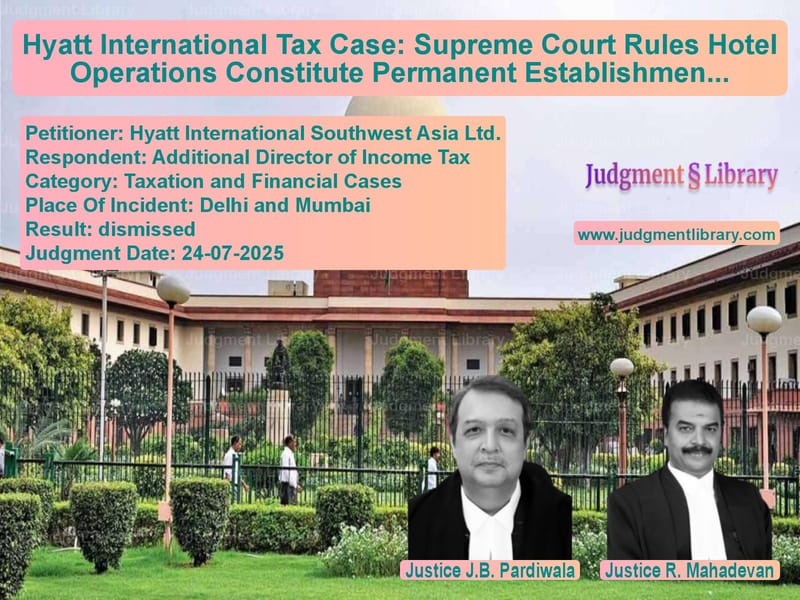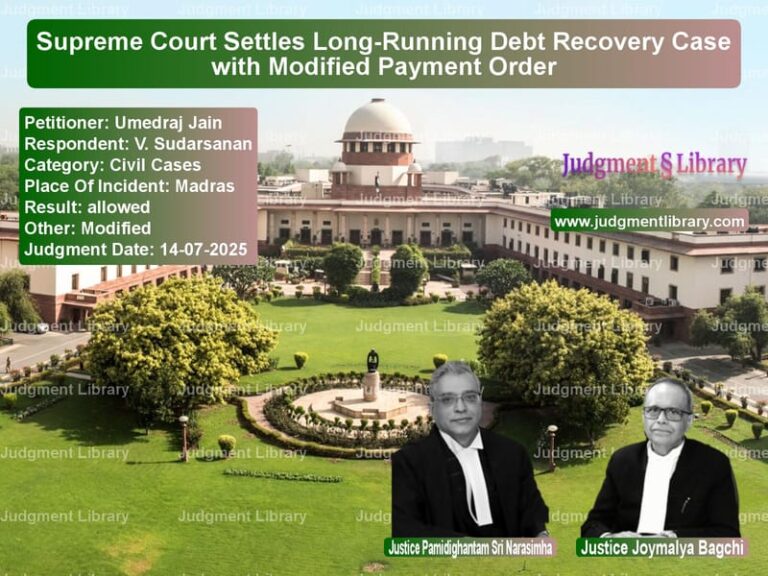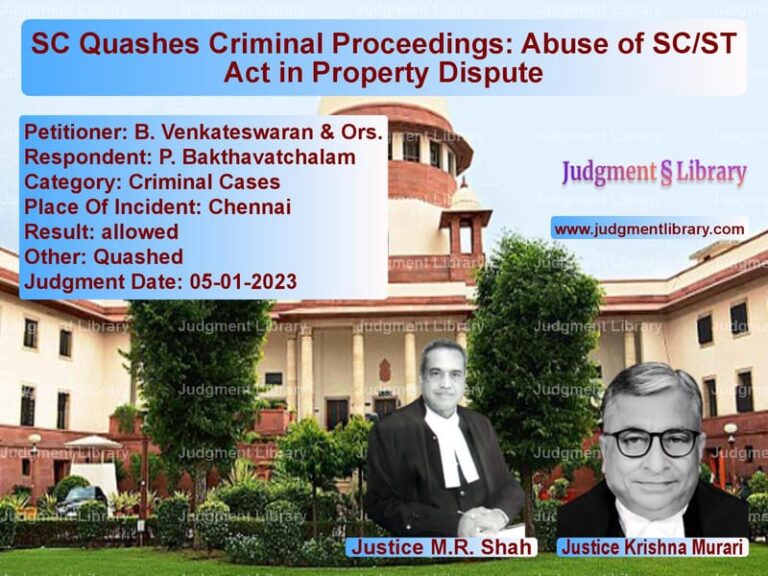Hyatt International Tax Case: Supreme Court Rules Hotel Operations Constitute Permanent Establishment in India
The Supreme Court of India recently delivered a significant judgment in a complex international taxation case involving Hyatt International Southwest Asia Ltd. and the Indian tax authorities. The case, which spanned multiple assessment years from 2009 to 2018, centered on whether the Dubai-based company had a Permanent Establishment (PE) in India through its operations at Hyatt hotels in Delhi and Mumbai.
The dispute began when Hyatt International filed tax returns in India declaring ‘Nil’ income for the assessment year 2009-10 and even claimed a refund. The company argued that as a tax resident of the United Arab Emirates under the India-UAE Double Taxation Avoidance Agreement (DTAA), its income wasn’t taxable in India. The company maintained it had no fixed place of business, office, or branch in India, and that its employees’ presence in India didn’t exceed the nine-month threshold under the DTAA.
However, the Indian tax authorities saw things differently. The Assessing Officer held that Hyatt’s activities constituted a business connection under Indian tax law and a Permanent Establishment under the DTAA. This finding was subsequently upheld by the Dispute Resolution Panel, the Income Tax Appellate Tribunal, and eventually the Delhi High Court, leading to Hyatt’s appeal before the Supreme Court.
The Core Legal Dispute
The fundamental question before the Supreme Court was whether Hyatt International Southwest Asia Ltd., a tax resident of the UAE, had a Permanent Establishment in India under Article 5(1) of the India-UAE DTAA. The answer to this question would determine whether the company’s income from Strategic Oversight Services Agreements with Indian hotel owners was taxable in India.
Article 5(1) of the DTAA defines a Permanent Establishment as “a fixed place of business through which the business of an enterprise is wholly or partly carried on.” This definition is consistent with international tax principles and India’s domestic tax law.
Hyatt International’s Arguments
The company’s senior counsel presented several key arguments challenging the finding of a Permanent Establishment. They emphasized that Hyatt International was a Dubai-based company rendering hotel consultancy and advisory services from Dubai to hotels in the Hyatt Group, including those in India. These services were provided under Strategic Oversight Services Agreements (SOSA) with each hotel owner individually.
The counsel argued: “The SOSA explicitly stipulates that the appellant shall render its services from Dubai and is not obligated to send or station any employee in India. However, the agreement permits at the appellant’s sole discretion, occasional and temporary visits by its employees to India.”
They further contended that the High Court had disregarded two essential conditions laid down in previous Supreme Court decisions for establishing a fixed place of business Permanent Establishment: “(a) There must be a specific, fixed, and identifiable physical location in India; and (b) Such location must be at the disposal of the foreign enterprise for use in carrying out its own business activities.”
The company maintained that there was no designated space or office at the hotel premises in Delhi or Mumbai that was specifically reserved for or placed at the disposal of Hyatt International. They argued that the company exercised no control or dominion over any part of the premises, and that mere involvement in policy decisions or enforcement of brand standards doesn’t amount to a fixed place of business Permanent Establishment.
Another crucial argument centered on the separation between Hyatt International’s SOSA and the Hotel Operating Services Agreement (HOSA) entered into by Hyatt India Pvt. Ltd. The counsel contended: “Hyatt India Pvt. Ltd. is a distinct legal entity, taxable independently under Indian law, and its operational activities cannot be attributed to the appellant for the purpose of determining PE under the DTAA.”
The Tax Department’s Position
The Additional Solicitor General of India, representing the tax authorities, presented a contrasting interpretation of the arrangements. He argued that under the Strategic Oversight Services Agreement, Hyatt International had more than mere access to the hotel premises – the premises were at the company’s “full and unconditional disposal.”
The government’s counsel emphasized that Hyatt International’s business was carried on through employees stationed at the hotel, thereby satisfying the criteria of a fixed place of business Permanent Establishment under the DTAA.
Referring to various clauses of the SOSA, the counsel submitted that Hyatt International’s role extended beyond high-level policy formulation into actual implementation. The company was involved in appointment and training of staff, monitoring daily operations, exercising financial oversight, and influencing procurement and operational decisions – all demonstrating managerial and functional control.
The government pointed to documentary evidence showing that some of Hyatt International’s employees remained in India for up to nine months and were involved in substantive hotel operations, clearly indicating operational presence in line with the SOSA terms.
The counsel relied heavily on the Supreme Court’s earlier decision in Formula One World Championship Limited v. Commissioner of Income Tax, arguing that the principles established in that case applied directly to Hyatt’s situation. He contended: “The appellant – Hyatt International Southwest Asia Ltd – has entered into a long-term agreement (20 years) under which it enjoys broad and continued control over the hotel’s key functions, including staffing, operations, strategic policy, and financial oversight.”
The Supreme Court’s Analysis
The Supreme Court conducted a detailed examination of the legal principles governing Permanent Establishments and their application to Hyatt’s operations in India. The Court emphasized that the concept of Permanent Establishment marks the dividing line for businesses between merely trading with a country and trading in that country.
The Court reiterated the essential principles from its Formula One decision: “for a Permanent Establishment (PE) to exist, two essential conditions must be satisfied: (i) the place must be ‘at the disposal’ of the enterprise, and (ii) the business of the enterprise must be carried on through that place.” The Court further explained that a Permanent Establishment must demonstrate three core attributes: stability, productivity, and a degree of independence.
The judgment extensively discussed the “disposal test,” noting that “the enterprise must have a right to use the premises in such a way that enables it to carry on its business activities. This test is to be applied contextually, taking into account the commercial and operational realities of the arrangement.”
The Court clarified that “exclusive possession is not essential – temporary or shared use of space is sufficient, provided business is carried on through that space.” This principle proved crucial in evaluating Hyatt’s arrangements.
Application to Hyatt’s Operations
After establishing the legal framework, the Supreme Court turned to the specific facts of Hyatt’s operations in India. The Court conducted a detailed review of the Strategic Oversight Services Agreement between Hyatt International and Asian Hotels Limited, finding that the appellant exercised “pervasive and enforceable control over the hotel’s strategic, operational, and financial dimensions.”
The Court noted that the agreement vested Hyatt International with powers to appoint and supervise the General Manager and other key personnel, implement human resource and procurement policies, control pricing, branding, and marketing strategies, manage operational bank accounts, and assign personnel to the hotel without requiring the owner’s consent.
The Court observed: “These rights go well beyond mere consultancy and indicate that the appellant was an active participant in the core operational activities of the hotel.”
The Court rejected Hyatt’s argument that the absence of an exclusive or designated physical space within the hotel precluded the existence of a Permanent Establishment. The judgment stated: “In Formula One, this Court expressly held that exclusive possession is not essential – temporary or shared use of space is sufficient, provided business is carried on through that space.”
The 20-year duration of the SOSA, coupled with Hyatt International’s continuous and functional presence, satisfied the tests of stability, productivity and dependence. The Court found that the functions performed by Hyatt International through its staff operating from the hotel premises were not just limited to setting up patterns of activities but represented core and essential functions, establishing control over day-to-day operations.
The Court also addressed Hyatt’s argument about the separate legal entity handling daily operations, stating: “It is well established that legal form does not override economic substance in determining PE status. The extent of control, strategic decision-making, and influence exercised by the appellant clearly establish that business was carried on through the hotel premises.”
Supreme Court’s Final Ruling
After comprehensive analysis, the Supreme Court affirmed the findings of the High Court that Hyatt International had a fixed place Permanent Establishment in India within the meaning of Article 5(1) of the DTAA. The Court concluded that the income received under the Strategic Oversight Services Agreement was attributable to this Permanent Establishment and therefore taxable in India.
The Court summarized its reasoning: “The appellant’s ability to enforce compliance, oversee operations, and derive profit-linked fees from the hotel’s earnings demonstrates a clear and continuous commercial nexus and control with the hotel’s core functions. This nexus satisfies the conditions necessary for the constitution of a Fixed Place Permanent Establishment.”
The Supreme Court dismissed all appeals filed by Hyatt International, bringing closure to a long-standing tax dispute that has significant implications for international businesses operating in India through similar arrangements.
This judgment reinforces the principle that in international taxation, substance prevails over form, and that businesses cannot avoid tax liabilities by maintaining legal separations while exercising substantive operational control through other means. The decision provides important guidance on how Permanent Establishment principles apply to international hotel management and similar service arrangements in India.
Petitioner Name: Hyatt International Southwest Asia Ltd..Respondent Name: Additional Director of Income Tax.Judgment By: Justice J.B. Pardiwala, Justice R. Mahadevan.Place Of Incident: Delhi and Mumbai.Judgment Date: 24-07-2025.Result: dismissed.
Don’t miss out on the full details! Download the complete judgment in PDF format below and gain valuable insights instantly!
Download Judgment: hyatt-international-vs-additional-director-supreme-court-of-india-judgment-dated-24-07-2025.pdf
Directly Download Judgment: Directly download this Judgment
See all petitions in Income Tax Disputes
See all petitions in Corporate Compliance
See all petitions in Judgment by J.B. Pardiwala
See all petitions in Judgment by R. Mahadevan
See all petitions in dismissed
See all petitions in supreme court of India judgments July 2025
See all petitions in 2025 judgments
See all posts in Taxation and Financial Cases Category
See all allowed petitions in Taxation and Financial Cases Category
See all Dismissed petitions in Taxation and Financial Cases Category
See all partially allowed petitions in Taxation and Financial Cases Category







